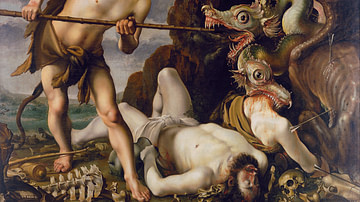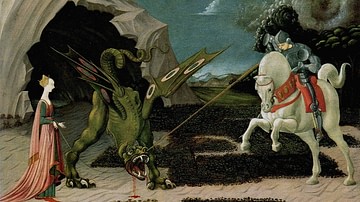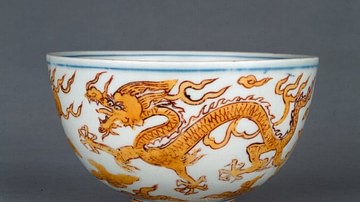Search
Search Results

Definition
Book of Revelation
The book of Revelation or the Apocalypse of John of Patmos is one of the most famous books in the New Testament. Written near the end of the 1st century CE, it is the only apokalypsis (Greek: "unveiling of unseen realities") that was included...

Image
Jason and the Dragon of Colchis
Attic kylix (drinking cup) with a scene depicting Athena rescuing the Thessalonian hero Jason from the jaws of the dragon of Colchis. The Colchian dragon was a massive serpent, immortal and sleepless, that guarded the Golden Fleece, which...

Definition
Zheng Yi Sao
Zheng Yi Sao (aka Ching Shih, Cheng I Sao, Ching Yih Saou or Mrs Cheng, d. 1844) was the chief of a massive pirate confederation which plundered the South China Sea in the early 19th century. She inherited the role from her late husband...

Image Gallery
A Gallery of Chinese Art & Architecture
Chinese culture developed from small communities such as Banpo Village (c. 4500 BCE) through the early Xia Dynasty (c. 2070-1600 BCE) and the great dynastic periods that followed after, creating some of the most striking and memorable works...

Collection
History of Chinese Literature
Ancient Chinese literature developed following the evolution of script which evolved from divination practices of the Shang Dynasty (1600-1046 BCE). The pictographs made on oracle bones by diviners became the script known as Jiaguwen (c...

Image
Dragon of the Ishtar Gate
A Babylonian mušḫuššu dragon, glazed tiles from the Ishtar Gate, which was constructed by Nebuchadnezzar II, c. 575 BCE.
Istanbul Archaeological Museums.

Image
Cadmus Slays the Dragon
Cadmus Slays the Dragon, oil on canvas by Hendrick Goltzius, between 1573 and 1617.
Koldinghus, Kolding, Denmark.

Image
St. George & the Dragon by Uccello
Saint George & the Dragon, painting by the Italian Renaissance artist Paolo Uccello (1397-1475), created c. 1470.
National Gallery, London.

Image
Ming Porcelain Bowl with Dragon
Porcelain bowl decorated with dragons chasing pearls. From the noted porcelain centre of Jingdezhen, Ming dynasty, 1573-1620. Height: 9.4 cm. Diameter: 14.9 cm.
The British Museum, London.

Definition
Ancient Japan
Ancient Japan has made unique contributions to world culture which include the Shinto religion and its architecture, distinctive art objects such as haniwa figurines, the oldest pottery vessels in the world, the largest wooden buildings anywhere...